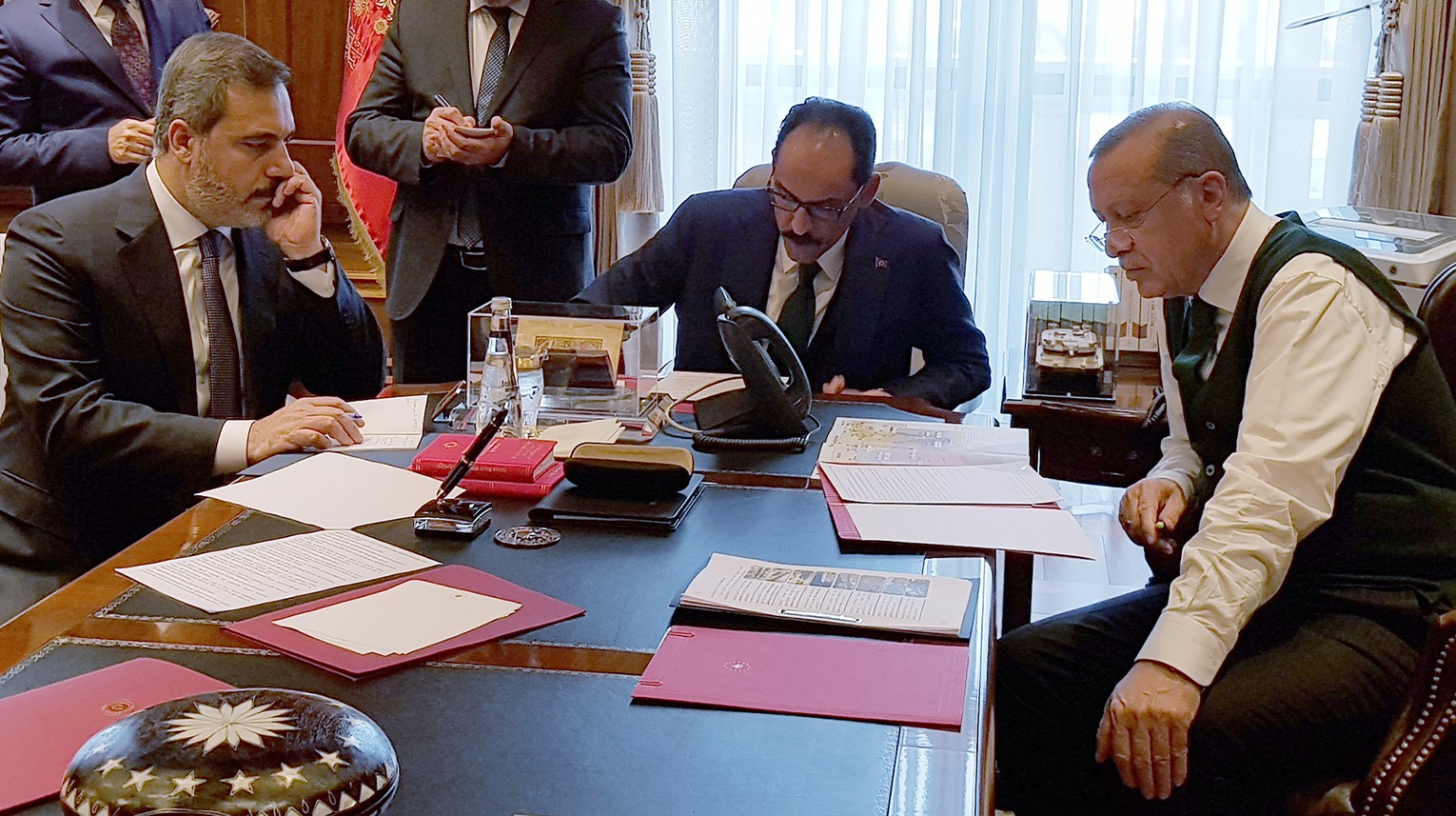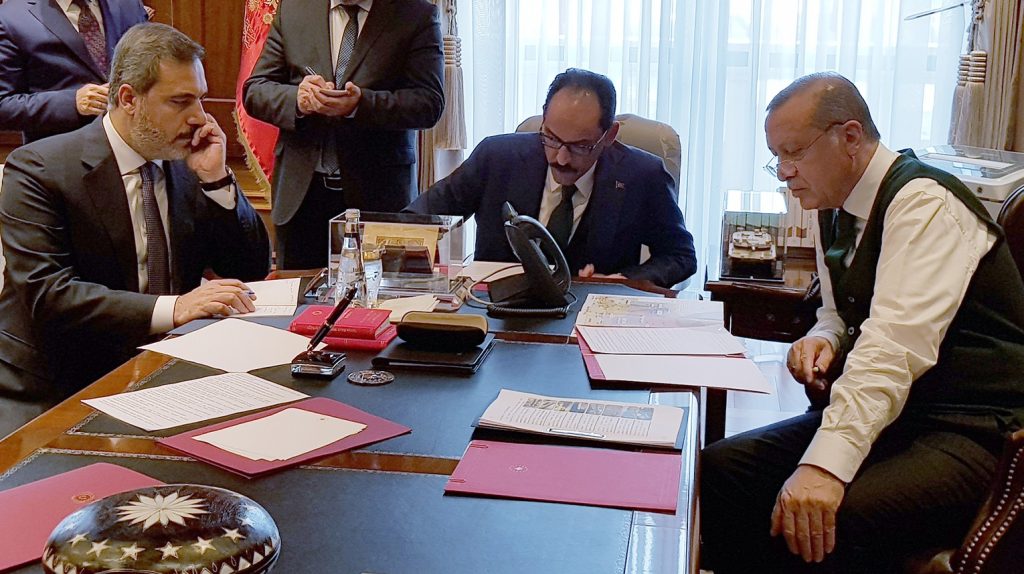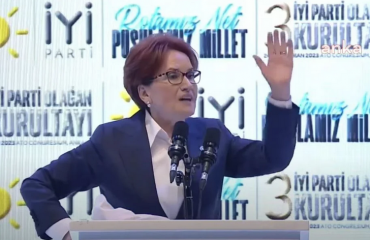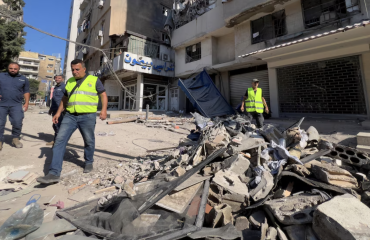

“Deeply concerned” that the U.S. strike on Iran could spread the Israel-Iran conflict globally, Türkiye did not condemn it. Here is why. The picture shows President Erdoğan with his Intelligence Director Kalın (M) and Foreign Minister Fidan (L) during a diplomatic call at the Presidential Office. (Official photo)
The U.S. Struck Iran at Israel’s Request. The U.S. launched B-2 heavy bombers from Whiteman Air Force Base in Missouri, with a 37-hour flight involving mid-air refueling, to drop reportedly six bunker-busting bombs on three Iranian nuclear facilities in Isfahan, Natanz, and Fordow, early on June 22, local time. While both European leaders and Turkish President Tayyip Erdoğan were expected to persuade Iran to return to the negotiation table, with mentions of a two-week timeframe, it was clear later that the attack order had already been given. At the same time, without naming them explicitly, the U.S. warned Russia and China to consider the superior American military power if they were contemplating intervening in the Israel-Iran crisis.
Why didn’t Ankara condemn the U.S. attack?
It could be assumed that Türkiye would immediately and strongly condemn the U.S. attack, but it did not. Nearly half a day after the strike, a written statement from the Turkish Foreign Ministry used sharp language, stating that the U.S. “attack” heightened the risk of the “conflict, escalated by Israel’s attacks starting on June 13,” spreading to a “global level” to the “highest degree.” Similarly, it noted Ankara’s “deep concern about the potential consequences of the U.S. attack on the nuclear facilities of the Islamic Republic of Iran.” However, the word “condemnation” was absent.
Likewise, the ruling AKP Spokesperson Ömer Çelik, who has recently been seen in Erdoğan’s close foreign policy circle, expressed discomfort and concern about the U.S. attack but avoided using the word “condemnation.”
This appears to be a deliberate political stance. Clues to its rationale can be found in both statements.
The Foreign Ministry’s statement concluded by saying, “Türkiye is ready to fulfill its responsibilities and provide constructive contributions.” Çelik, meanwhile, recalled Erdoğan’s contacts with “world and regional leaders” following Israel’s attack on Iran, stating Türkiye’s readiness to “facilitate and host” efforts for peace.
Erdoğan’s diplomatic contacts
Following the Israeli attacks that began on June 13, Erdoğan held talks with world and regional leaders, with the Israel-Iran conflict as the main topic. According to the Presidency of Communications, these calls, in order, were as follows:
• June 14
– Saudi Crown Prince Mohammed bin Salman
– Jordan’s King Abdullah II
– Iranian President Masoud Pezeshkian
– Egyptian President Abdel Fattah el-Sisi
– Pakistani Prime Minister Shehbaz Sharif
These phone calls were announced before a security meeting chaired by the President, attended by Foreign Minister Hakan Fidan, Defense Minister Yaşar Güler, Turkish intelligence (MİT) Director İbrahim Kalın, and AKP Spokesperson Ömer Çelik. On June 14, there were also meetings with Syria’s interim President Ahmed al-Shara and U.S. President Donald Trump.
Two calls each with Trump and Pezeshkian
The next day, unusually, Erdoğan held another call with Trump. But before that call, here’s who else he spoke with:
• June 15
– Oman’s Sultan Haitham bin Tariq. Oman hosted five rounds of U.S.-Iran nuclear talks.
– Kuwait’s Emir Jaber Al-Sabah.
– Iraqi Prime Minister Shia al-Sudani.
– U.S. President Donald Trump.
On that day, Trump was at the G7 summit in Canada. When he left after the opening session, responding to French President Emmanuel Macron’s comment that it could be for a ceasefire, Trump said Macron had no idea about it. “It’s for something bigger.” We now know what he meant.
According to the Turkish Presidency of Communications, in Erdoğan’s call with Trump, Ankara’s readiness to facilitate dialogue between the U.S. and Iran was discussed.
The following day, on June 16, Erdoğan spoke again with Pezeshkian, reiterating Türkiye’s readiness to facilitate.
As the U.S. prepared to strike
Also on June 16, we see Erdoğan discussing the Israel-Iran issue with Russian President Vladimir Putin. The day before, Putin had declared Russia’s readiness to mediate or facilitate between Israel and Iran. However, Türkiye was aiming to facilitate direct contact between the U.S. and Iran.
On the same day, Israeli Prime Minister Benjamin Netanyahu requested that Trump use GBU-57 bombs to strike Iran’s underground nuclear facilities and enter the war, while Erdoğan, after a cabinet meeting, mentioned Türkiye’s medium- and long-range missiles.
On June 17, Erdoğan discussed the same issues with UAE leader Al Nahyan and Qatar’s Emir Al Thani.
On June 21, the American news site Axios published a significant claim. On June 20, as Iranian Foreign Minister Abbas Araghchi, after a fruitless meeting in Geneva with the EU and foreign ministers of the UK, France, and Germany, was heading to İstanbul for an Organization of Islamic Cooperation meeting, few knew that U.S. B-2 bombers were already in the air, under Trump’s orders, to drop GBU-57 bombs on Iran.
A Trump-Pezeshkian meeting?
Around the time Erdoğan was urging Araghchi to return to negotiations, Axios reported that Erdoğan had proposed to Trump a meeting with Pezeshkian in Türkiye, that Trump was open to the idea, but that Pezeshkian couldn’t secure approval from Supreme Leader Ali Khamenei, causing the plan to fall through. This claim has not been denied, and Erdoğan’s intense diplomatic engagements during those days lend credibility to it.
Ankara cannot aspire to mediate between Hamas and Israel or Iran and Israel, as its relations with Israel, due to the Gaza massacres, are severely strained, leading Türkiye to confront Israel on every platform. However, by aiming to mediate between the U.S. and Iran, Türkiye seeks to keep channels open with the U.S.
Moreover, as a NATO member, Türkiye maintains ongoing contacts with the U.S. in at least two other critical areas: Russia-Ukraine and Azerbaijan-Armenia talks.
Türkiye has no interest in War
Iran is currently poised for internal developments. I’m not referring to Reza Pahlavi, the son of the deposed Shah, who lacks public support and is openly backed by Israel. However, there is a diplomatic belief that if Khamenei delegates some of his authority, a path could be found with Pezeshkian. A meeting with Trump in Türkiye would be a bonus; this is the opportunity Erdoğan is unwilling to abandon.
Türkiye has no interest in war, neither politically nor economically. It’s hard to predict how high oil prices would soar if Iran closed the Strait of Hormuz.
On the other hand, Türkiye’s insistence on returning to nuclear negotiations isn’t solely because Iran is currently Netanyahu’s target. Iran possessing nuclear weapons, as opposed to nuclear energy, is a prospect that would also unsettle Türkiye. This was partly why Türkiye, alongside Brazil, took on a facilitating role in nuclear talks in the past (with Hakan Fidan as the Turkish “sherpa”).
Another critical issue is the Kurdish issue. A prolonged Israel-Iran war could disrupt the PKK’s disarmament process, officially termed the “Terror-free Türkiye” initiative. This is a risk Erdoğan wants to avoid.


